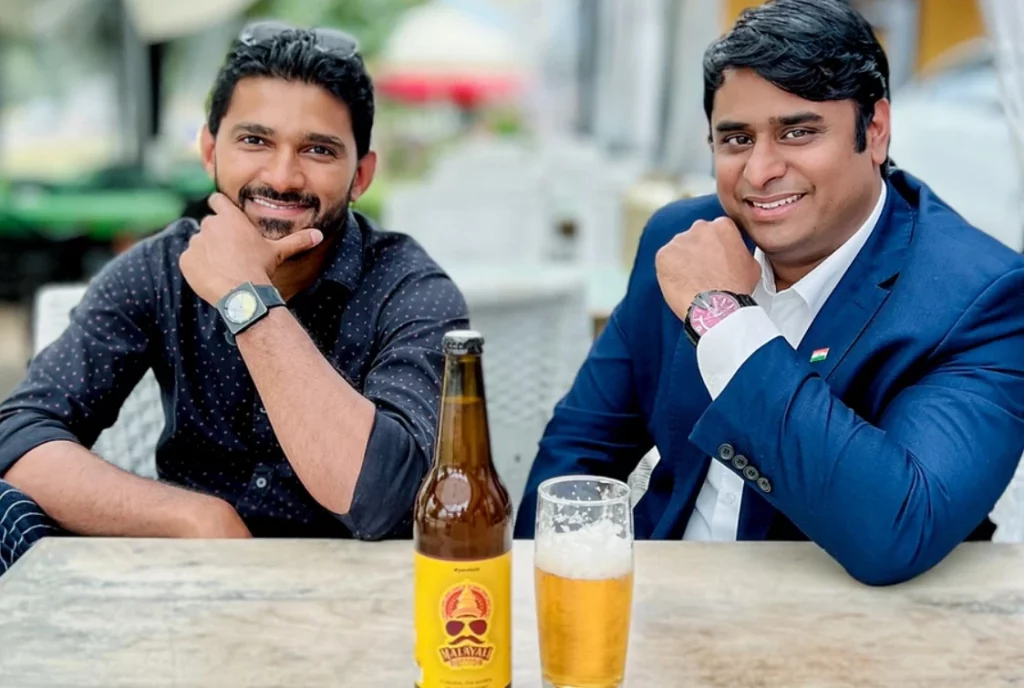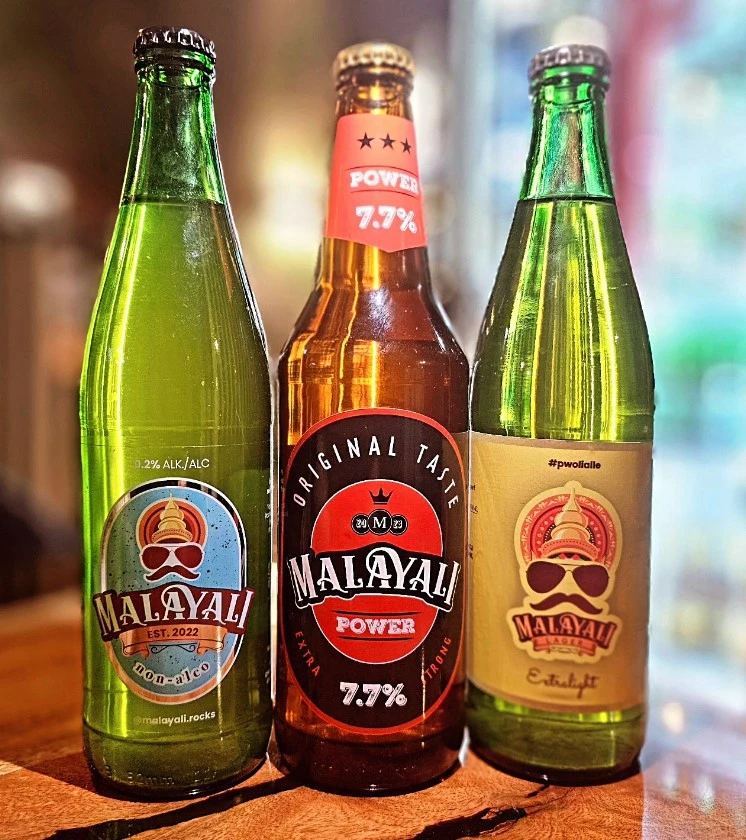(October 6, 2024) Chandramohan Nallur and Sargheve Sukumaran used rice flakes (poha) that were going waste, to make a beer which is fast becoming a much-loved brand in Europe, and not just with the Indian diaspora.
Serendipity would be a key factor if a case study is ever done on the Malayali beer brand. What else could explain two enterprising young men from Palakkad, Kerala, meeting in far-off Poland and launching a beer that is popular among Europeans and the Indian diaspora? It’s a story where chance, creativity, and opportunity come together – serendipitously.

Chandra Mohan Nallur and Sargheve Sukumaran
Poha + Hops = Hybrid Lager
Chandramohan (Chandu) Nallur, a corporate consultant who is also the youngest Director of the Indo-Polish Chamber of Commerce and Industry (IPCCI) in Poland, completed his Master’s degree in international business and politics, in Spain. While studying, he worked part-time at an Irish bar and discovered he enjoyed creating and serving drinks. A teetotaller himself, Chandu worked with Lyca Mobile and moved to Poland when the company wanted to set up a branch there. He headed the telecom and operations departments. He recalls, “After four years of corporate life, I became a consultant and then, as the Director of the IPCCI, would represent clients here. One such client from Varanasi, who was into rice exports, approached me because five tonnes of his shipment of rice flakes was on hold, days before it was to get here. The buyer backed off due to the start of the Ukraine-Russia war and he wanted to know what could be done instead of having it sent back.”
Speaking of the war, Chandu says, “My friend Pradeep Nayar and I were the first people from the civilian end who went to the border during Operation Ganga. I created a network of 298 volunteers who worked for a week with the MEA and arranged 5000 SIM cards for people crossing the border so they could contact their families.”
Sargheve Sukumaran, the co-founder, is a product and experience designer with extensive experience in designing mobile phones, consumer electronics, and packaging. He has been living in Poland for over a decade. He and Chandu, both of whom have Polish spouses, met during their early years in the country and have remained great friends. When this opportunity arose, they got talking. They had initially considered various ideas, including pet food, which didn’t gain much traction. Inspired by Komban beer, launched in the UK by another Keralite, they decided to create a hybrid beer. As Sargheve recalls, “We drew up a list of brewers and asked them to craft it for us using rice flakes and European hops.”

As for zeroing in on the recipe, Sargheve elaborates, “We experimented with various combinations, collaborating closely with brewers from the brewery we partnered with, as well as independent consultants. Our primary goal was to create ‘the smoothest beer’—an idea which, at the time, only existed in our imagination. The existing recipes were merely starting points, and we knew we had to refine and iterate to achieve the perfect balance. The minimum order was for 2000 litres or 4000 bottles. After the third try, we were satisfied with our product. We made sampling boxes, shared them with restaurants and friends and families. I am a social drinker and the exposure to design research due to the profession came in handy during the tasting process. We tweaked it until we got it right.”
Rooted in Kerala
Both the founders were clear they wanted a brand and logo that had deep Indian roots. Sargheve, the designer of the brand’s logo explains, “We wanted a logo that reflected our Indian heritage while resonating with a global audience.” The design draws inspiration from the traditional face masks of Kathakali and Theyyam, with elements borrowed from the iconic Ray-Bans sunglasses and moustache sported by Mohanlal in his blockbuster film Sphadikam. This combination captures the essence and swag of the actor, alongside Kerala’s most celebrated dance forms. The brand name Malayali instantly connects emotionally with people, especially the growing Kerala community in Poland.
Chandu reveals how the beer became popular. “We started stocking it at Indian restaurants – and 39 out of the 144 restaurants in Warsaw served our beer. The local Polish people and the female crowd too liked it. Through distributors, we expanded into Indian supermarkets and recently, we started exporting to Lithuania, Germany, Malta, Austria, Latvia, Italy and the UK. Currently, we are in talks to supply it to the UAE, Bahrain, Malaysia, Indonesia, and Singapore. By the end of this year, we will be launching in a couple of these markets.”

Malayali lager’s logo
The beer also sells at a few Indian supermarkets in Poland and if price points are to be compared, the price is similar to that of Heineken in restaurants but is 40% cheaper in supermarkets. And, out of the seven brands commonly served at Indian restaurants, the Malalyali has successfully pushed four off the shelves and proudly stands with Cobra and Kingfisher – other brands with an Indian association.
Malayali Superstars
Within six months of their November 2022 launch, the partners sold 50,000 bottles. Sargheve shares the current varieties and their taste profiles: “We offer beers with 4.8% and 7.2% alcohol content, as well as a non-alcoholic version at 0.2%. This year, we plan to introduce a zero-alcohol version and a 12% alcohol beer for those who prefer a stronger drink. If I were to describe the taste, our flagship lager is exceptionally smooth with a light body, offering a well-balanced interplay of subtle malt sweetness and just the right amount of hop bitterness. It’s crisp, refreshing, and easy to drink, with a clean finish. Feedback shows it not only complements the bold, spicy flavours of Indian cuisine, but also pairs effortlessly with mainstream European dishes, making it versatile for a wide range of palates.”
With their beer in so much demand that they are unable to match the supply, plans are afoot to expand production. Says Chandu, “We are looking to lease a brewery. Since the business is self-funded, the pace is slower. The plan is to go from the current 12000 litres to 40,000 litres.” The duo also wants to create a brand of tequila, and enter into the black water arena [alkaline water high in minerals] besides expanding the Malayali brand and taking it to other countries.
View this post on Instagram
For now, the Malayali beer is going strong with Indians and locals alike in Poland and its neighbouring countries. With the kind of demand it is facing, the beer is soon likely to become a global brand in the days to come. Good going for these lads from Palakkad.




